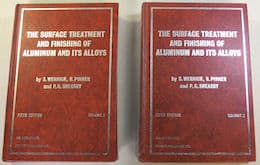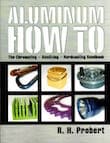
Curated with aloha by
Ted Mooney, P.E. RET

The authoritative public forum
for Metal Finishing 1989-2025

Thread 62/37
Why a Sticky film on anodize?
Q. I have an intermittent problem with my anodizing line, sticky parts. It has happened on one particular customers parts more often then on others. The parts are 6061-T6 alum plate and processed Type II, Class 2, black. Nothing appears to be abnormal about the part, they are clean. Also, the "stickiness" isn't always apparent when the parts are being unracked and packaged, but shows up later usually at the customer's facility.
I have changed the seal and the de-smut baths, because I felt that the seal was the main culprit, but now I am not so sure. If anyone has experienced this problem or may know what can cause or is causing it, please let me know. Thanks in advance, Lamar
Lamar Jackson- Fort Walton Beach, Florida
2000
publicly reply to Lamar Jackson
Treatment &
Finishing of
Aluminium and
Its Alloys"
by Wernick, Pinner
& Sheasby

(note: this book is two volumes)
on eBay or
AbeBooks
or Amazon
(affil links)

Aluminum How-To
"Chromating - Anodizing - Hardcoating"
by Robert Probert
Also available in Spanish
You'll love this book. Finishing.com has sold almost a thousand copies without a single return request :-)
A. This may sound too simplistic, but might it be coming from the packaging?
Dan Brewerchemical process supplier - Gurnee, Illinois
2000
publicly reply to Dan Brewer
A. Long time no see Lamar,
I have this too, also on 6061 T-6 material, it doesn't matter sometimes if its clear, or black. Its almost like you run your hand across the part, and instead of gliding along the surface like normal, your hand hesitates in areas.
The only thing I can attribute it to is the seal, and its not that its doing its job too well, its that its not doing its job. I have left parts unsealed to verify this, unsealed, they exhibit this same problem. I'd double check your seal again, there's something in them thats causing this, and for reference, I use Clariant CS-2 liquid (Low/Mid Temp Nickel Fluoride). If you use a similar product, and not nickel acetate, we may have found the culprit. Also, since I use low/mid temp, I found moving the temp up around 140-150, seems to degrade, and or eliminate this problem in some cases, not all, but in some.
Matthew Stiltner- Toledo, Ohio
2000
publicly reply to Matthew Stiltner
A. To Lamar:
Regarding your sticky problem. I too accuse the sealing but just in case check the alloy of the aluminum and make sure it is 6061 and not something else! It happens suppliers switch alloys without telling . Good luck
Khalil Sawalha- Amman Jordan
2000
publicly reply to Khalil Sawalha
A. Lamar:
By chance did you narrow this problem down? I'd like to see what your conclusion was on this one, as I'm sure others would to. The other thing, did you get the list I sent to you? With the filler rod / material selections on it? I can't remember if I faxed it or e-mailed it to you, but I sent it one way or the other. If you haven't got it, let me know I'll resend it to you.
Matthew Stiltner- Toledo, Ohio
2000
publicly reply to Matthew Stiltner
A. The first thing to check if sealing problems exist is the purity of the water. Trace quantities of certain elements will inhibit sealing. Silica, for example will inhibit sealing in parts per million. The second thing, as mentioned by Mathew Stiltner, is the temperature, the higher the better.
Gerald Lee Allen- Hayward, California, USA
2001
publicly reply to Gerald Lee Allen
Multiple threads merged: please forgive chronology errors and repetition 🙂
Anodized parts are sometimes sticky
Q. Why does the anodized parts feel sticky to the touch? we had this condition on some parts and need to take that sticky film feeling off them. Thank you for your attention to this letter
Mario Rodriguez- phoenix, Arizona USA
2000
publicly reply to Mario Rodriguez
|
A. Hi Mario! If you don't already use it's advisable to add Clariant Anodal SH-1, Almeco seal plus or a similar chemical. This helps to clean the surface and hopefully removes the sticky film. Martin Dehlin- Sweden 2000 publicly reply to Martin Dehlin A. If the parts you are talking about are Type II and supposedly sealed, then your seal is not working correctly or you are not leaving the parts in the seal long enough (consult the manufacturer's product bulletin). If the parts are Type III anodized and not dyed and sealed, then they will be sticky. Sjon Westre- Minden, Nevada 2000 publicly reply to Sjon Westre A. Mario, Sounds like maybe your parts are not sealed properly. Darrell Barker- Carrollton, Texas USA 2000 publicly reply to Darrell Barker A. We have discussed this before around here and I think for the most part we have pretty much attributed it to a failing seal tank or a weak concentration in the seal. Try sealing the parts in a fresh tank, even if its a small bucket that has the solution heated to proper temps and the parameters otherwise are correct, if that solves the problem then its time to change your seal. Matthew Stiltner- Toledo, Ohio 2000 publicly reply to Matthew Stiltner |
Tacky 2024 Anodized Parts
Q. I have 2024 Alum. getting Blue Anodize per MIL-A-8625, Type II, Class 2. These parts are coming out tacky feeling. I have had my seal titrated, and all checks fine. My seal is relatively new, and should not need changed. I only have this problem with one customer. All other parts are not getting that tacky feel to them. Seal of course was my first thought, but again all other parts are coming out fine and my seal checks out. I am using a Nickel Acetate seal. And I just went and spoke with my operator and all parameters are being kept, all procedures are being followed. I thought it may be the rinse, but that is also in parameters. Does anyone know of any other reasons or suggestions as to what could be going on?
Lindsey Smithson- Vonore, Tennessee U.S.
October 7, 2016
publicly reply to Lindsey Smithson
A. Has the 2024 been heat treated? Racked on titanium? Stainless Steel dye tank? Is there a nitric post dip between the anodize and the dye? How clean, how hot is the hot water rinse following the sticky vinegar ⇦in bulk on eBay or Amazon [affil links] seal? To consider "pore size" which leads to bleeding, also let us know the free acid, dissolved aluminum, ASF,and anodizing temp.

Robert H Probert
Robert H Probert Technical Services
Garner, North Carolina

October 7, 2016
publicly reply to Robert H Probert
Q. The 2024 Alum. has not been heat treated, It is racked on Titanium. We use a poly tank, and no nitric post dip. The rinse tank is ambient, The anodize temp is 58 °F. My dissolved Alum. is 9.9, and my free acid is 173.
Lindsey Smithson [returning]- Vonore, Tennessee
October 10, 2016
publicly reply to Lindsey Smithson
|
October 10, 2016 Most likely you are "anodizing by voltage". 2024 takes higher voltage to get 12 ASF than most other alloys. If your voltage, and hence your amperage is low, then you get a larger pore. The larger pore will "bleed". Several things will help.  Robert H Probert Robert H Probert Technical Services Garner, North Carolina  publicly reply to Robert H Probert October 11, 2016 Try the marker test. If the marker wipes off, the part is sealed. If it does not and absorbed, then the surface is not sealed. Foresight Finishing LLC - Tempe, Arizona  publicly reply to Casey Weizel, President You mention that your seal titrates fine, but have you tested the actual seal quality on the parts? I would recommend doing a dye stain test on the part. Just because everything titrates OK, it still doesn't mean things are working as they should. The only way to know for sure is to test the coating on the part, or a coupon from the same material ran with the parts.  Marc Green anodizer - Boise, Idaho October 12, 2016 publicly reply to Marc Green |
Q, A, or Comment on THIS thread -or- Start a NEW Thread